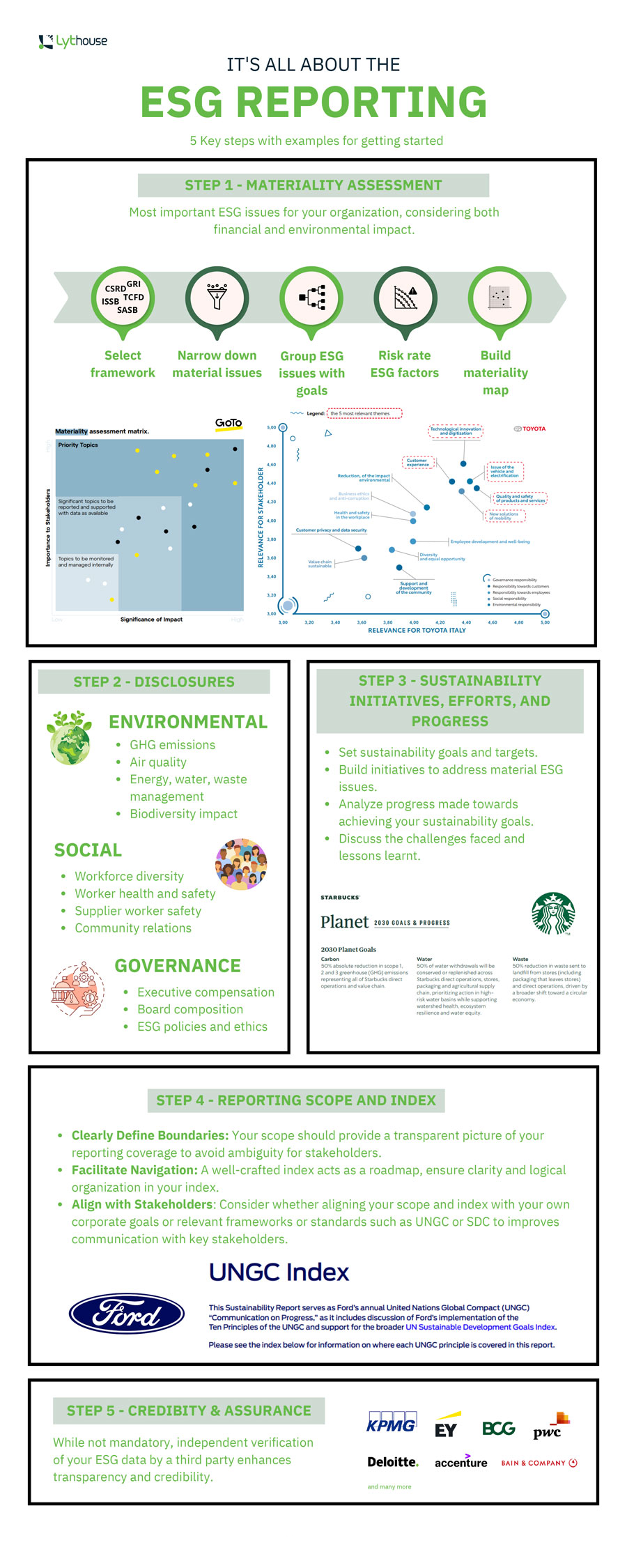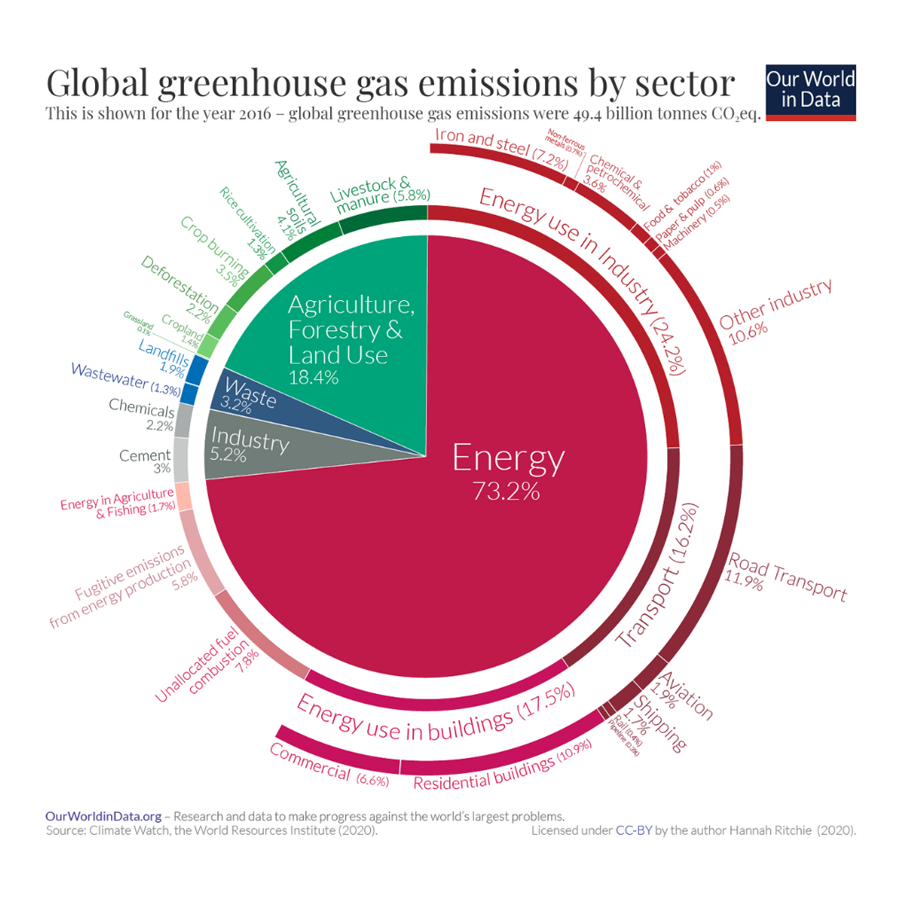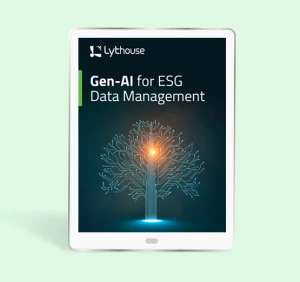Statistics of world weather have been disrupted over past few decades. Increasingly organizations want to set the right sustainability example. ESG reports have become a way to establish key goals and, in a way, to communicate an organization’s performance across three key areas: environmental, social, and governance. While specific elements may vary depending on goals and priorities, some critical components generally form the backbone of these reports.
Checkout this infographic to get started with your ESG Reporting

Top 5 Automobile latest ESG Report Examples: Driving Towards Sustainability

Automobile industry is a one of the biggest contributors of GHG emissions across the globe and hence there has been a conscious effort from automobile manufacturers to mend their ways and go sustainable. Here are few examples of ESG reports.
1. Tesla Impact Report: Tesla is built on the foundation of sustainability, fuel conservation. They have pioneered electric vehicles, Tesla’s “Impact Report” is a transparent and engaging read. The report provides the details of emissions reduction, renewable energy integration, and responsible sourcing. Their report clearly gives detailed data visualizations and storytelling that highlights their mission.
Download it here: Latest Tesla Impact Report
2. Toyota Sustainability Report: Toyota emphasizes its commitment to zero-emission mobility and building a circular economy. It leads with some great examples of innovations like hybrid and hydrogen fuel cell vehicles, demonstrating a multi-pronged approach to sustainability.
Access the full report here: Latest Toyota Sustainability Report
3. BMW Sustainability Report: BMW’s report focuses on the “ACES” strategy – “Autonomy, Connectivity, Electrification, and Shared & Services”. They have outlined some of the ambitious targets for CO2 reduction and making their supply chain circular.
Explore it here: BMW Sustainability Report
4. Stellantis: “Dare Forward” by Stellantis, formed from the merger of Fiat Chrysler and PSA Group, highlights the commitment to “clean, safe, and affordable mobility.” This report highlights the importance of transparency, acknowledging challenges alongside progress on carbon emissions reduction and diversity, equity, and inclusion (DE&I) initiatives.
Check out more here: Latest Stellantis CSR Report
5. Ford: “Sustainability Report” by Ford outlines its “Ford+ Plan” for sustainable growth. This one stands out for its focus on environmental justice. This example of ESG report addresses the impact of its operations on communities aligning more towards the social disclosures. Additionally, the report emphasizes investments in clean technologies and responsible supply chain practices.
Find it here: Ford Sustainability Report
Top 5 Pharma latest ESG Report Examples: Leading the Way in Healthcare Sustainability
Pharma can be a challenging yet a highly rewarding sector when dealt well with ESG. This industry plays a crucial role in global health and well-being, but it also faces significant environmental and social challenges. Fortunately, many leading pharma companies are becoming torch bearers for Environmental, Social, and Governance (ESG) practices to ensure responsible and sustainable operations.
Here are 5 top-notch pharma example of ESG reports showcasing impactful leadership:
1. Johnson & Johnson Responsibility Report:
Johnson & Johnson presents a comprehensive yet balanced approach to ESG, covering all the aspects of environmental, social and governance. This report shines in its:
· Focus on community impact: Highlighting initiatives like their Healthy Lives, Thriving Communities program that addresses public health needs in communities that are underserved.
· Transparency in reporting: Provide clear data and metrics on their progress towards their ESG goals.
Details here – Latest Health for Humanity Report
2. Novo Nordisk Sustainability Report:
Novo Nordisk emphasizes its commitment to tackling climate change and make sure that everyone gets the access to healthcare. This report stands out for its:
· Ambitious climate goals: Setting a science-based target to achieve net-zero emissions by 2045.
· Innovative solutions: Showcasing sustainable practices across their operations, including energy-efficient facilities and responsible waste management.
Details here – Novo Nordisk Reporting on ESG Performance
3. AstraZeneca Global Sustainability Report:
AstraZeneca focuses on its “Healthy Lives, Healthy Planet” ambition. This report excels in its:
· Stakeholder engagement: Globally health challenges are becoming untamable their focus is on collaboration with various partners to address global health challenges.
· Social responsibility: Under their social disclosures they focus on employee well-being, diversity & inclusion, and responsible sourcing practices.
Details here – Sustainability at AstraZeneca
4. Merck & Co. Environmental, Social & Governance Progress Report:
Merck & Co. details their progress towards ambitious ESG goals.
· Transparency in data: Report provides detailed metrics on environmental impact, social initiatives, and governance practices.
· Materiality assessment: Clearly outlining the most important ESG issues for their stakeholders and business.
Details here – Merck publishes Environmental, Social & Governance (ESG) Progress Report
5. Roche Sustainability Report:
Roche showcases its commitment to “shaping a better future for healthcare.” This report impresses with its:
· Focus on innovation: They have highlighted the sustainable product development and responsible use of resources for continued sustainability.
· Global reach: They have rewardingly demonstrated their impact on health equity and access to medicines worldwide.
Details here – Roche Diagnostics Asia Pacific Sustainability Report
6. GlaxoSmithKline Sustainability Report:
GlaxoSmithKline (GSK) have set ESG goals and this report covers their progress in detail. This report is notable for its:
· Focus on access to medicines: They are running programs like GSK Access, which provides affordable medicines to people in low- and middle-income countries.
· Community engagement: Demonstrating their commitment to supporting communities through various initiatives.
Details here – Latest GSK ESG Performance Report
7. Pfizer Global Citizenship Report:
Pfizer report focuses on their commitment to “working together for a healthier world.” This report is impressive for its:
· Focus on health equity: Highlighting their efforts to address health disparities and improve access to healthcare for underserved communities.
· Data-driven approach: Providing detailed metrics on their environmental impact, social initiatives, and governance practices.
Details here – Latest Pfizer ESG Report
Top 5 Consumer Durables, Household and Personal Products latest ESG reports
1. Unilever: Leading the charge in sustainability, Unilever’s report, “Living our Purpose,” focuses on the progress made towards its ambitious 2030 goals. It shines through clear storytelling, data-driven insights, and an open discussion of challenges.
Download it here: Unilever Sustainability Performance Data
Check out here- Case Study of Leaders in Climate Strategy Disclosure: Unilever
2. Schneider Electric: “Sustainability Report” by Schneider Electric highlights its commitment to a low-carbon future through its products and operations. It stands out for its transparent approach to metrics and targets.
Access it here: Schneider Electric Sustainability Report
Check out here- Schneider Electric closes with strong Sustainability Impact results
3. Sony Group: “Sustainability Report” by Sony Group outlines its “Long-Term Vision | ESG 2040” plan. This report is notable for its:
· Focus on innovation: Highlighting sustainable product development and responsible use of resources.
· Global reach: Demonstrating their impact on environmental and social issues worldwide.
Check out here- Sony Group Sustainability Report 2024
4. LG Electronics: “ESG Report” by LG Electronics details its commitment to its “ESG Management Vision 2030.” This report is impressive for its:
· Data-driven approach: Providing detailed metrics on their environmental impact, social initiatives, and governance practices.
· Stakeholder engagement: Highlighting collaboration with various partners to address sustainability challenges.
Check out here- LG Sustainability Report
5. Whirlpool Corporate Social Responsibility Report: By Whirlpool Corporation showcases its commitment to “Building a More Sustainable Future.” This report stands out for its:
· Focus on circular economy: Highlighting initiatives to reduce waste and increase product lifecycles.
· Community engagement: Demonstrating their commitment to supporting communities through various programs.
Check out here – Whirlpool Annual Report
Download eBook: Discover key findings from our analysis of 1,500 ESG Reports of suppliers in this comprehensive E-book
Top 5 Food and Beverage Processing Companies latest ESG Reporting Examples
1. Nestlé: “Creating Shared Value Report” – This comprehensive report details Nestlé’s progress on its environmental, social, and governance (ESG) goals, covering areas like responsible sourcing, climate action, and water stewardship. It’s known for its data-driven approach and clear storytelling.
Check out report here- Nestle’s ESG Report
2. PepsiCo: “Sustainability Report” – PepsiCo’s report focuses on its “pep+” sustainability framework, addressing water usage, greenhouse gas emissions, waste reduction, and responsible sourcing. It’s recognized for its engaging design and emphasis on stakeholder feedback.
Check out report here- PepsiCo Sustainability Report
3. Unilever: “Living our Purpose” – As mentioned before, Unilever’s report shines with its clear communication, data visualization, and honest discussion of challenges alongside progress. It covers their ambitious 2030 goals across various sustainability aspects.
Check out report here- Unilever’s Report
4. Danone: “Integrated Annual Report” – Danone’s report blends financial and sustainability information, showcasing their commitment to “One Planet. One Health.” It’s praised for its transparency and focus on regenerative agriculture practices.
Check out report here- Danone Integrated Annual Report Cover
5. The Kraft Heinz Company: “Corporate Social Responsibility Report” – This report outlines Kraft Heinz’s approach to ESG, highlighting areas like responsible sourcing, employee well-being, and community engagement. It’s valued for its conciseness and focus on material issues.
Check out report here – The Kraft Heinz Company ESG Report
Top 5 Software Companies 2024 sustainability reports:
1. Microsoft: Microsoft Sustainability Report 2023 –
Highlights: Ambitious climate goals, responsible AI development, data privacy protection.
Strengths: Data-driven approach, transparency, and comprehensive coverage of ESG topics.
2. SAP: SAP Integrated Report 2023 –
Highlights: Circular economy solutions, social impact through technology, responsible supply chain management.
Strengths: Clear structure, interactive features, and focus on stakeholder engagement.
3. Accenture: Accenture ESG Report –
Highlights: Skills development programs, diversity & inclusion initiatives, carbon neutrality target.
Strengths: Storytelling approach, community impact focus, and alignment with the UN SDGs.
4. Infosys: Infosys Sustainability Report –
Highlights: Renewable energy adoption, resource conservation efforts, employee well-being initiatives.
Strengths: Conciseness, focus on material issues, and integration with financial reporting.
5. IBM: IBM Corporate Social Responsibility Report –
Highlights: Responsible AI principles, environmental stewardship, ethical sourcing practices.
Strengths: Focus on technology for good, commitment to ethical AI development, and alignment with ESG frameworks.
Get our Gen-AI e-Book for standout ESG reports and industry-leading standards.
Top 5 Chemical Industry latest ESG Report Examples: Advancing Sustainable Chemistry
The chemical sector plays a crucial role in global manufacturing but is also at the forefront of environmental challenges. These reports highlight efforts to mitigate impacts and innovate sustainably:
1.BASF:
Product stewardship: Focuses on lifecycle analysis of products to minimize environmental impact.
Resource efficiency: Emphasizes waste reduction and energy efficiency.
Details here: BASF’s Report for Environment, Health, and Safety
2. Dow:
Circular economy: Advances in recycling and reusing materials within production processes.
Climate change initiatives: Detailed strategies for reducing carbon footprint.
Details here: Dow’s Sustainability Report
3. DuPont:
Innovation in materials: Develops materials that support sustainable industries like renewable energy.
Community engagement: Strong focus on community development and education programs.
Details here: DuPont’s Sustainability Report
4. Solvay:
Sustainable operations: Emphasizes reducing emissions and water usage across its global operations.
Employee well-being: Prioritizes worker safety and health initiatives.
Details here: Solvay’s Integrated Report
5. Eastman:
Environmental management: Highlights efforts in biodiversity and environmental conservation.
Social initiatives: Focuses on enhancing workforce diversity and inclusion.
Details here: Eastman’s Corporate Responsibility Report
Top 5 Energy Sector latest ESG Report Examples: Fueling Sustainable Energy Futures
The energy sector is critical to the global economy and faces immense pressure to transition towards sustainable practices amid climate change challenges:
1.BP:
Energy transition: Detailed strategies for shifting from fossil fuels to renewable energy sources.
Operational excellence: Focuses on improving safety and reducing environmental impact.
Details here: BP’s Sustainability Report
2. Shell:
Carbon neutrality goals: Commitment to becoming a net-zero emissions energy business by 2050.
Community and stakeholder engagement: Extensive initiatives to work collaboratively with communities.
Details here: Shell’s Sustainability Report
3. ExxonMobil:
Technology and innovation: Invests in technologies to reduce greenhouse gas emissions.
Water stewardship: Efforts to manage water responsibly in water-stressed regions.
Details here: ExxonMobil’s Sustainability Report
4. Chevron:
Renewable Energy Projects: Emphasizing significant investments in renewable energy sectors to ensure a sustainable energy future.
Operational Excellence: Continuous improvement in operational standards to reduce environmental impact and enhance safety measures.
Details here: Chevron’s Sustainability Report
5. Total Energies:
Energy Transition Initiatives: Detailed strategies for shifting from traditional energy sources to more sustainable ones, reflecting a commitment to reducing carbon footprints.
Stakeholder Engagement: Comprehensive efforts to involve stakeholders in dialogue and action, ensuring inclusive progress toward sustainability goals.
Details here: Total Energies Sustainability Report
Advancing ESG Reporting: Diverse Industry Examples and Emerging Trends
- ESG Reporting in the Renewable Energy Sector The renewable energy sector is setting new standards in ESG reporting by highlighting their impact on reducing carbon emissions. Companies like NextEra Energy provide detailed metrics on energy production from renewable sources, significantly showcasing their contribution to environmental sustainability. NextEra Energy’s reports often include data on the gigawatt-hours of clean energy produced, alongside reductions in greenhouse gas emissions, aligning with global climate goals.
- Sustainability Initiatives in the Hospitality Industry Major hotel chains, such as Marriott International, are enhancing their ESG reports by including sustainability efforts in energy efficiency, waste management, and ethical labor practices. Marriott’s reports detail initiatives like reducing single-use plastics, implementing energy-efficient technologies, and supporting local communities, thereby providing a holistic view of their sustainability endeavors and stakeholder engagement.
- ESG Practices in the Fashion Industry The fashion industry faces unique challenges due to its extensive supply chains and high environmental impact. Brands like H&M are leading with ESG reports that not only cover carbon footprint and water usage but also delve into supplier compliance with labor standards and the use of sustainable materials. H&M’s ESG reports emphasize efforts to increase the use of recycled fabrics and the brand’s shift towards a circular economy.
- Financial Implications and ESG Reporting in Banking Banks such as HSBC are increasingly focusing on the financial implications of climate change in HSBC ESG reports. These reports discuss the integration of climate risk into financial forecasting and planning, detailing the bank’s investments in sustainable projects and its strategy to phase out support for coal-fired power plants, reflecting a commitment to financial stability through sustainable practices.
- Technological Impact on ESG Reporting in the Tech Industry Technology giants like Google are pioneering in ESG reporting by leveraging big data and AI to monitor and manage their environmental and social impacts. Google’s ESG reports often highlight innovations such as using AI to reduce energy use in data centers and initiatives aimed at promoting digital inclusion, thereby providing insights into how technology can drive sustainability in the digital age.
- Circular Economy Models in the Manufacturing Sector Progressive manufacturing firms are integrating circular economy models into their ESG narratives, focusing on resource efficiency and waste reduction. These reports detail initiatives like remanufacturing, refurbishing, and recycling of materials, showcasing the industry’s commitment to minimizing environmental impact while enhancing product lifecycle sustainability.
- Digitalization and ESG Integration in Telecommunications Telecommunication companies are increasingly embedding ESG metrics into their operational frameworks through digital transformation. Reports from these companies detail advancements in energy-efficient data centers, the deployment of sustainable infrastructure, and initiatives for digital inclusion, reflecting how digitalization supports their sustainability objectives.
- Agricultural Advances in ESG Reporting The agricultural industry is enhancing its ESG reporting by detailing sustainable farming practices, the impact of bioengineering on crop yields and soil health, and efforts in water conservation. These reports highlight the adoption of innovative farming technologies that help in reducing the environmental footprint and improving food security.
- Sustainable Tourism Practices in Travel and Leisure Travel companies are increasingly focusing on sustainable tourism, with ESG reports that highlight eco-friendly practices such as carbon offset programs, preservation of cultural heritage, and promoting local economies. These reports provide insights into how the industry is addressing the environmental and social impacts of global tourism.
- Pharmaceuticals and Healthcare’s Approach to ESG The pharmaceutical industry is focusing on ESG reporting around ethical sourcing and distribution, patient access to medicine, and innovation in sustainable healthcare solutions. Reports typically include initiatives for reducing emissions in production, enhancing global health equity, and investments in sustainable healthcare technologies and infrastructure.
How we can help
Lythouse is designed to assist companies in seamlessly managing ESG initiatives across various facets discussed in this blog. With the Carbon Analyzer, Lythouse ensures precise tracking and management of carbon emissions, enhancing transparency and accuracy. The Green Supplier Network streamlines Scope 3 emissions tracking and fosters supplier collaboration, further bolstering sustainability efforts. The Goal Navigator aids in setting, monitoring, and achieving ESG goals, driving meaningful progress. Lastly, the ESG Reporting Studio simplifies compliance with diverse global ESG frameworks, ensuring timely and accurate reporting. Together, these integrated tools enable companies to enhance their ESG performance and achieve regulatory compliance effectively .
Conclusion
As we continue to navigate the complexities of sustainability, the ESG reports from leading organizations in multiple industries offer a roadmap to corporate responsibility and environmental stewardship. By examining these examples, companies across all industries can gain insights into the successful integration of ESG principles into business strategies, demonstrating a commitment to not only financial performance but also to social and environmental impact.
For organizations looking to start or enhance their ESG journey, these reports serve as a benchmark for establishing robust sustainability practices that meet global standards and stakeholder expectations. Moreover, they underscore the importance of transparency and accountability in fostering trust and long-term value creation.
FAQ’s
1.What are the most common challenges companies face when initiating ESG reporting?
Companies often encounter several challenges when starting ESG reporting, including:
- Data Collection: Gathering comprehensive and accurate data across different departments can be cumbersome without established processes.
- Stakeholder Alignment: Ensuring all stakeholders understand and commit to ESG goals requires effective communication and change management strategies.
- Setting Measurable Goals: Companies may struggle to define realistic and measurable ESG targets that align with both business objectives and sustainability criteria.
2. How do ESG reports influence investor decisions?
ESG reports significantly influence investor decisions by providing a clear picture of a company’s commitment to sustainability and responsible business practices. Investors use these reports to assess risks and opportunities related to environmental, social, and governance factors, which can affect a company’s long-term value. Transparent and robust ESG reporting can attract investors who are increasingly prioritizing sustainability in their investment portfolios.
3. What are the benefits of integrating AI and technology in ESG reporting?
Integrating AI and technology in ESG reporting offers several benefits:
- Efficiency: Automated tools can streamline the data collection and reporting process, reducing the time and resources required.
- Accuracy: AI can help in processing large volumes of data with minimal errors, enhancing the reliability of ESG reports.
- Insightful Analysis: Advanced analytics can uncover trends and insights that might not be visible through manual analysis, aiding strategic decision-making.
4. How can companies ensure the accuracy and reliability of their ESG data?
To ensure the accuracy and reliability of ESG data, companies can:
- Implement Robust Internal Controls: Establishing strong internal controls over data collection and reporting processes is crucial.
- Regular Audits: Conducting regular internal and external audits can help verify the accuracy of ESG data.
- Training and Awareness: Training staff on the importance of accurate data collection and consistent reporting standards is essential.
5. What role do third-party audits play in ESG reporting?
Third-party audits play a critical role in enhancing the credibility of ESG reports by:
- Providing an Independent Assessment: External auditors can validate the accuracy and completeness of the data reported, offering an unbiased view of the company’s ESG performance.
- Enhancing Stakeholder Trust: Reports verified by reputable third parties can increase confidence among investors, customers, and other stakeholders.
- Identifying Areas for Improvement: Auditors can also provide insights into areas where a company might improve its practices, helping to drive continuous improvement in sustainability efforts.
Top 5 trending ESG blogs:
- ESG Risk Management Framework: A Guide for Businesses
- ESG Reporting for the Public Sector: How to Demonstrate Your Commitment to Sustainability
- ESG Risk Management: Identifying, Assessing, and Mitigating ESG Risks
- ESG Data Security and Privacy: A Guide for Enterprises
- ESG Data Management Best Practices: Ensuring Integrity and Impact

Sonal is leading product and content marketing initiatives at Zycus. She is a problem solver. She has a proven track record of defining positioning and messaging for various product modules, creating go-to-market strategies for new features and product launches, and fostering collaboration between Product Management, Sales, and Customer Success teams.







